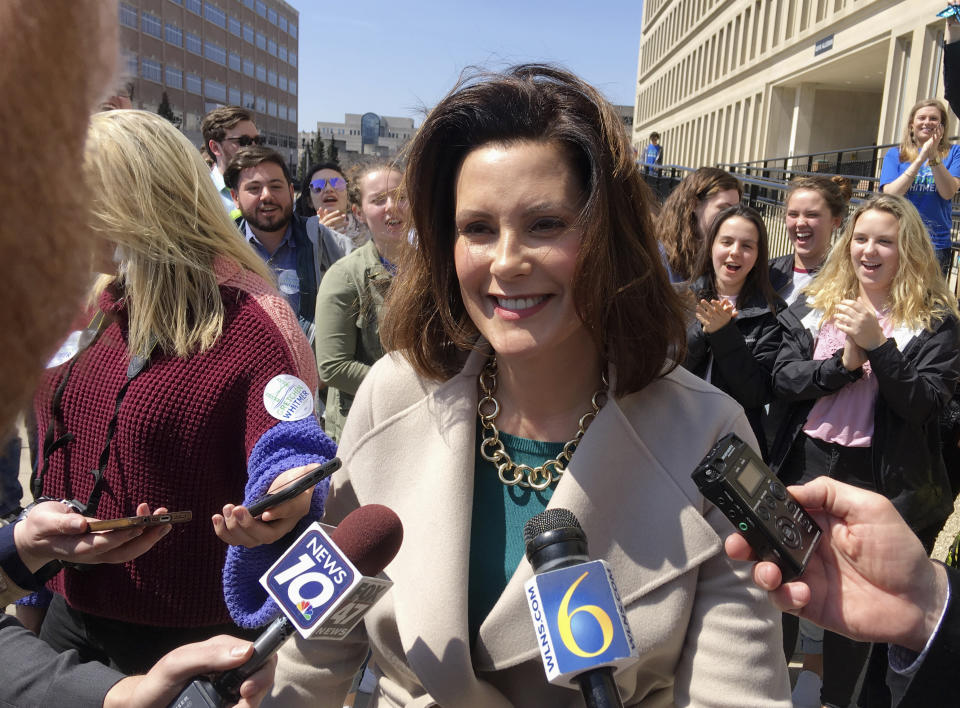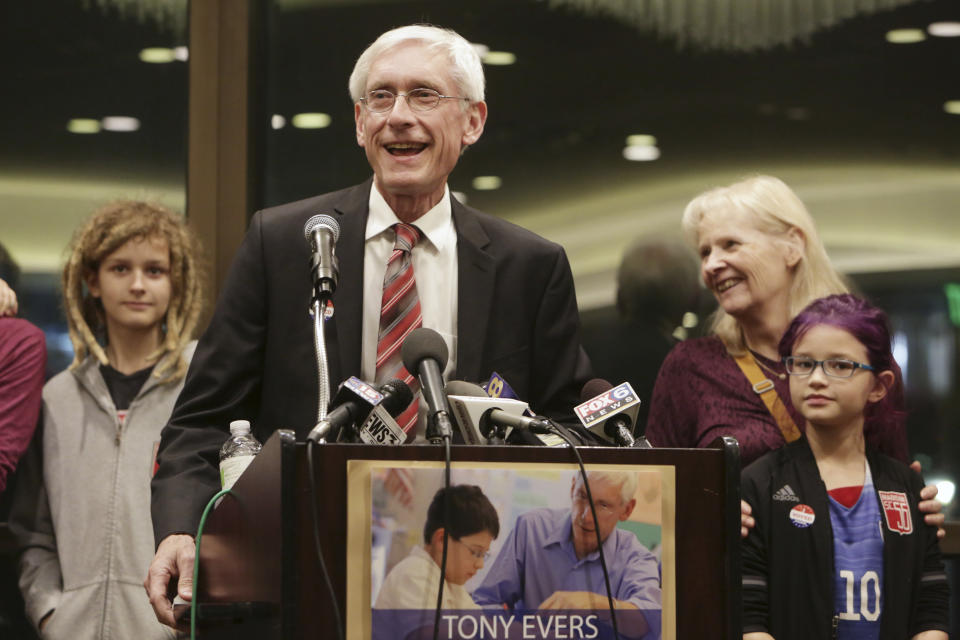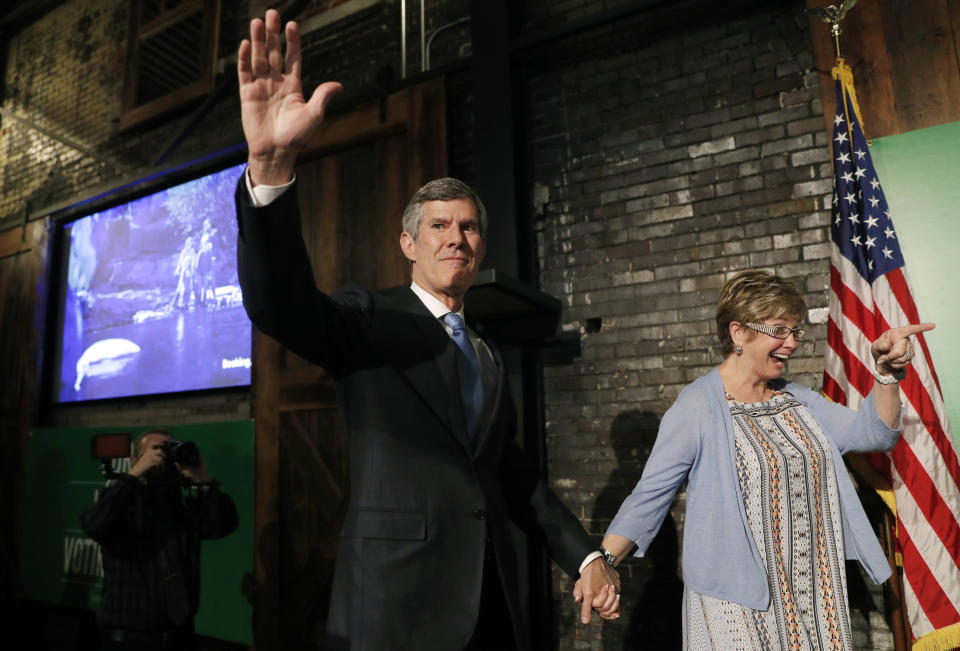Democrats look to retake governors' mansions where Trump won in 2016

Long before Donald Trump stunned the political world by notching victories across the Midwest, Republicans had begun capturing governorships in traditionally Democratic states like Michigan, Ohio and Wisconsin. Now, in the first midterm election since Trump rose to power, Democrats are looking to rebuild their former gubernatorial stronghold.
“The Democrats have been on the outside looking in for a long time,” Bill Ballenger, a longtime Michigan political analyst, told Yahoo News. “They’re very hungry and very frustrated and angry. … They’re pretty fired up.”
In Michigan, former state senate leader Gretchen Whitmer is regarded as the frontrunner among the three Democrats vying to advance in the Aug. 7 primary and go on to try to take back the governor’s mansion. Running on a promise to “fix the damn roads” and to improve Michigan schools, Whitmer will likely face Attorney General Bill Schuette, the leading candidate in the GOP primary, who advocates cutting taxes and making Michigan a right-to-work state, and has already received Trump’s endorsement.
“It comes down to issues and messaging,” Ed Sarpolus, a Michigan Democratic pollster, told Yahoo News. “Everyone knows that the state’s Democrats do better on women’s issues and education. The question is, is Gretchen going to be able to talk about jobs, the economy, what she’s going to do for [voters]?”

Susan Demas, vice president of Farough & Associates, a public relations firm that specializes in campaign strategy, said that winning back the governorship in Michigan would have “huge implications” for Democrats.
“I think it was a huge blow for Democrats to lose the Upper Midwest in 2016 and really set off a lot of alarm bells about how their agenda is faring with more blue-collar voters and older voters who have an upsized importance in states like Wisconsin and Michigan, Ohio, Pennsylvania,” she told Yahoo News.
Ohio Democrat gubernatorial nominee Richard Cordray brings a wealth of experience to the race against Republican Attorney General Mike DeWine. Cordray, the former attorney general, solicitor general and treasurer in the state, also served as the first director of the Consumer Financial Protection Bureau under President Obama. Having beaten Dennis Kucinich in a left-of-center primary, Cordray has been endorsed by liberal Sen. Elizabeth Warren, D-Mass.
In 2010, DeWine and Cordray faced off in Ohio’s attorney general race, which DeWine won. The Republican candidate’s opponents portray him as an establishment career politician. He has served as a state representative, senator and lieutenant governor.
“There’s no doubt that, when it comes to operating the governor’s office, the tone sets the direction of everything,” David Pepper, chairman of the Ohio Democratic Party, told Yahoo News. “And we’re pretty eager to be able to lead the state again.”
Although victory is still not assured, Cordray has steadily whittled away DeWine’s lead in the polls, closing an 8 point deficit in March. In a recent Quinnipiac poll, the race was too close to call.

As they have for the past two cycles, Wisconsin Democrats are facing an uphill battle to unseat Scott Walker, who is seeking his third term. Against the field of Democrats vying for the nomination, Walker leads all of them.
Tony Evers, the state superintendent, leads the pack of candidates who want to face Walker, but in a recent poll many Democratic voters say they are still uncertain about who they will vote for in the August primary.
Evers has been outspoken on the need to increase funding for education, but he has been hit by opponents in the race who have called him “Republican-lite.” Walker, meanwhile, has faced down numerous challenges since being elected governor and has more money than the Democratic field, with over $5 million raised in three months.
As in Ohio, polls show the governor’s race in Iowa has turned from leaning Republican to a tossup.
Republican Gov. Kim Reynolds, who took Terry Branstad’s place after he became ambassador to China, is seeking re-election. Fred Hubbell, the Democratic candidate, is a businessman who has never held political office.
Reynolds signed the “Heartbeat” bill in May, banning abortions in the state once a heartbeat has been detected. Hubbell, by contrast, has been endorsed by Planned Parenthood and has criticized the legislature for defunding the organization and privatizing Medicaid.

Troy Price, chairman of the Iowa Democratic Party, said winning back the governorship would prove the Hawkeye State is still purple.
“The energy on the Democratic side, broadly, is unbelievable,” he said. “I think it’s the highest we’ve seen in a decade, if not longer.”
The number of registered Democrats in Iowa jumped 4 percent from June to July, which could be an indication of a party surge in November.
As states begin to prepare for redistricting battles after the 2020 census, having more Democratic governors is a top priority for the party. Wisconsin and Michigan have redistricting processes that are controlled by state legislatures — and governors have the power to veto any measure they put forth.
“We’ve had Republican control [in Michigan] for eight years,” Demas said. “Were the Democrats to at least win back one branch of government, it means the Democrats have veto power and that’s a huge factor for them.”
In the age of Trump, what remains unclear is whether the Democrats’ emphasis on health care, rebuilding infrastructure and building on job growth will distinguish them from Republicans enough in the minds of voters.

“Right now, some of the most disciplined candidates, while of course calling out things they see that are troubling, like Helsinki, they also know that, at the end of the day, voters are still voting with their pocketbooks,” Pepper said. “And that’s very true all over Ohio.”
The key to retaking governorships in much of the Midwest comes down to whether Democrats can substantially boost midterm voter turnout so soon after a bruising presidential election.
“Even if they have a spectacular turnout [in Michigan], it’s still going to be drastically lower,” said Jake Davison, owner of Inside Michigan Politics. “The Republican turnout will also be lower but not nearly as low.”
Nationwide, Republicans control 33 governors’ mansions, while Democrats hold 16 (Alaska Gov. Bill Walker is an independent). Ten races are currently rated as tossups, and seven of those seats are held by Republicans.
“If Democrats win back the governorship in Michigan and they have success in some of the other Upper Midwest states, I think that’s going to have a huge psychological impact on the party,” Demas said.
Read more from Yahoo News:
Ex-NSA official: Russian hack of Democrats was ‘assembly line operation’
Brett Kavanaugh’s ex-boss: It’s ‘preposterous’ to demand his recusal from Mueller cases
‘I thought I would never see him’: Asylum seeker and son reunite after border separation
After Trump’s defense of Putin, sighs of resignation — but nobody’s resigning (yet)
Trump and Putin: The admiration is mutual, the benefits one-sided
Photos: Candlelight vigil in front of White House is part of nationwide protest



